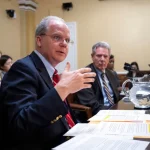

West Virginia is banning four more banks from state contracts over their ESG policies and “boycotts” of fossil fuel companies.
Riley Moore, the West Virginia state treasurer, made the announcement on Monday. The firms, which include Citibank, TD Bank, Northern Trust, and HSBC Holdings, had all been notified in February that their state contracts were at risk.
The state had already placed five firms on its restricted institutions list — BlackRock, Goldman Sachs, J.P. Morgan Chase, Morgan Stanley, and Wells Fargo. The first five firms on the list have lost access to some $18 billion in annual inflows and outflows.
“That’s certainly, I think, a tremendous loss for them,” Moore told the Washington Examiner during a Monday phone call after the latest four firms were added. “We really kicked off this coalition effort around this, so they are going to be other states looking at what we have done. And I would not be surprised in the future if you did see some of these institutions end up on other lists.”
Notably, Moore had notified six different firms in February that they would be added to West Virginia’s restricted financial institution list in 45 days unless they could demonstrate to Moore’s office that they were not engaged in a boycott of fossil fuel companies.
Moore said that two of those firms, BMO Bank and Fifth Third Bank, actually altered their policies to avoid getting added to the Mountain State’s restricted institutions list, something he called “quite a bit of a success story.”
“At the end of the day, this is how we win,” Moore said. “Trying to get banks to act like banks, keeping the free market free.”
The move is just another push in a larger Republican broadside against environmental, social, and governance practices, known as ESG, which has been a growing priority for corporations and financial institutions over the years.
The shift away from fossil fuels is part of the larger corporate move toward the prioritization of ESG goals. Proponents argue that ESG is a way the finance and business sectors can help reform society, such as by mitigating the effects of climate change. Those who oppose ESG say it distorts the economy and even the culture.
Other Republican-led states have gone after major firms over concerns about ESG.
CLICK HERE TO READ MORE FROM THE WASHINGTON EXAMINER
For instance, in a cease-and-desist order last month, Mississippi Secretary of State Michael Watson accused money manager BlackRock of making “fraudulent statements, omissions, and other misrepresentations” about its environmental, social, and governance strategies.
Also recently, Texas State Board of Education Chairman Aaron Kinsey notified BlackRock that the state was pulling some $8.5 billion in investments from it over its ESG policies.







